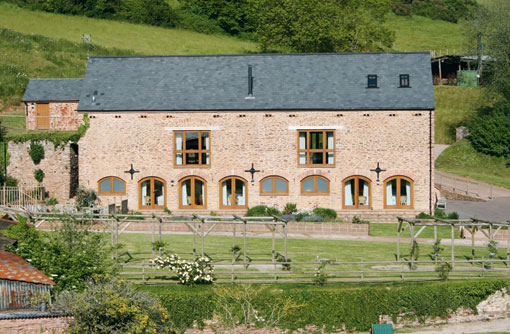Renewables Heat Incentive struggle was worth it for Exmoor farm

Wood Advent Farm in Exmoor installed a biomass boiler three years ago to help insulate the business from rising oil costs. It has just started to receive RHI payments after a somewhat prolonged application period that has demanded both patience and perseverance.
The 162ha mixed farm installed a Dragon Energy D20 boiler in 2009 to heat the large (242sq m) farmhouse and old granary barn (160sq m) that had just been converted into a self-catered holiday let in the summer and fully-catered let in the winter for the guns on the farm’s commercial pheasant shoot.
Wood Advent Farm
- 162ha mixed farm (61ha arable, remainder forestry, pasture and game crops
- 50 beef cows and 100 sheep
- B&B accommodation in main farmhouse, plus self/fully-catered accommodation in barn
- Commercial pheasant shoot (25-28 days a year)
- Go to www.exmoorholidaybarn.co.uk to find out more
“The price of heating oil was only going to increase and we would not have been able to heat the barn with oil,” explained David Brewer, who runs the business with his parents.
Accreditation struggle
“We looked around at a lot of different options, but eventually steered down the biomass boiler route. Our normal farmhouse’s heating oil bill was £3,000 a year, now we use no oil.”
In December 2011, the Brewers applied for RHI accreditation and were finally accepted on 22 March this year. “It’s been a long and sometimes frustrating process, but we’re glad to have finally done it,” said Mr Brewer. “A lot of the problems we had were probably because the scheme was so new and people weren’t clear on exactly what to do. If you were to put an application in today, I think they advise it’ll take around eight weeks for complex systems to get accredited.”
RHI documents
- Self-catered accommodation is heated by biomass at Wood Advent Farm.
- Supporting documents required by Ofgem for RHI accreditation
- Bank details for payment
- Details about the plant (for example, commissioning certificate/invoices of purchase)
- Certificate proving your meters meet the Class 2 Measuring Instruments Directive (MID) requirements
- A clear schematic diagram of your heating system
- An independent metering report (for complex installations over 45kW)
- Go to www.ofgem.gov.uk/rhi to find out more
One of the main issues with the RHI accreditation at Wood Advent Farm was the classification of the system as complex rather than a simple system. This was largely due to heat being piped 65m underground from the boiler to the self-catering unit and meant that extra metering was required. “Being classified as a complex system effectively trebled the cost of what we had to do to receive the RHI,” said Mr Brewer. “As it was being defined as a complex system, we decided we might as well run the pipes an extra 70m to connect the farmhouse to the boiler, too.”
Once meters were installed on the boiler, at the self-catering unit and at the farmhouse, an independent metering report was carried out to check and approve the system. “It cost about £500 for the guy to come out, but he was really helpful, so it was money well spent for us.”
The additional metering, pre-insulated pipework to connect the farmhouse (£75/m) and heat exchanger cost about £6,000, but with anticipated RHI income of £10,000 a year, Mr Brewer was confident it was the right decision to make the most of the boiler.
First payment
Quarterly readings are taken from all three meters to calculate how much RHI-eligible heat has been generated. These readings are submitted to Ofgem via an online database, from which the RHI payment is calculated automatically.
| The boiler |
|---|
|
Mr Brewer submitted the first set of periodic data under the RHI on 22 July and, although payment was due on 3 August, cleared funds were not received until 31 August.
“There’s certainly been lots of toing and froing and paperwork, but hopefully it’s all been worth it,” he said. “You need the energy and enthusiasm to keep pushing and phoning people.”
He also advised anyone considering going into the RHI to carefully read and understand the guidance notes. “They can be quite daunting, but there are lots of hidden things, such as the location of meters, which can be costly to correct if you have to go back and do it at a later date.”
It is also worth shopping around and asking advice from those actually installing the kit before buying any equipment, he said. “For example, the first heat meter we bought in December 2011 cost £800, but we got this down to £350 for the others by looking around online and speaking to people.”
For more information about the Renewables Heat Incentive, visit our Farm Energy page
